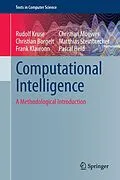Computational intelligence (CI) encompasses a range of nature-inspired methods that exhibit intelligent behavior in complex environments.
This clearly-structured, classroom-tested textbook/reference presents a methodical introduction to the field of CI. Providing an authoritative insight into all that is necessary for the successful application of CI methods, the book describes fundamental concepts and their practical implementations, and explains the theoretical background underpinning proposed solutions to common problems. Only a basic knowledge of mathematics is required.
Topics and features:
- Provides electronic supplementary material at an associated website, including module descriptions, lecture slides, exercises with solutions, and software tools
- Contains numerous examples and definitions throughout the text
- Presents self-contained discussions on artificial neural networks, evolutionary algorithms, fuzzy systems and Bayesian networks
- Covers the latest approaches, including ant colony optimization and probabilistic graphical models
- Written by a team of highly-regarded experts in CI, with extensive experience in both academia and industry
Students of computer science will find the text a must-read reference for courses on artificial intelligence and intelligent systems. The book is also an ideal self-study resource for researchers and practitioners involved in all areas of CI.
Autorentext
Rudolf Kruse is a full professor at the Department of Computer Science of the Otto-von-Guericke University of Magdeburg, Germany, where he leads the working group on computational intelligence. Christian Moewes and Pascal Held are research assistants at the same institution. Christian Borgelt is a principal researcher at the European Centre for Soft Computing, Mieres, Spain. Frank Klawonn is a Professor at the Department of Computer Science of Ostfalia University of Applied Sciences, Wolfenbüttel, Germany. Matthias Steinbrecher is a member of the SAP Innovation Center, Potsdam, Germany.
Klappentext
This clearly-structured, classroom-tested textbook/reference presents a methodical introduction to the field of CI. Providing an authoritative insight into all that is necessary for the successful application of CI methods, the book describes fundamental concepts and their practical implementations, and explains the theoretical background underpinning proposed solutions to common problems. Only a basic knowledge of mathematics is required. Features: provides electronic supplementary material at an associated website, including module descriptions, lecture slides, exercises with solutions, and software tools; contains numerous examples and definitions throughout the text; presents self-contained discussions on artificial neural networks, evolutionary algorithms, fuzzy systems and Bayesian networks; covers the latest approaches, including ant colony optimization and probabilistic graphical models; written by a team of highly-regarded experts in CI, with extensive experience in both academia and industry.
Inhalt
Introduction
Part I: Neural Networks
Introduction
Threshold Logic Units
General Neural Networks
Multi-Layer Perceptrons
Radial Basis Function Networks
Self-Organizing Maps
Hopfield Networks
Recurrent Networks
Mathematical Remarks
Part II: Evolutionary Algorithms
Introduction to Evolutionary Algorithms
Elements of Evolutionary Algorithms
Fundamental Evolutionary Algorithms
Special Applications and Techniques
Part III: Fuzzy Systems
Fuzzy Sets and Fuzzy Logic
The Extension Principle
Fuzzy Relations
Similarity Relations
Fuzzy Control
Fuzzy Clustering
Part IV: Bayes Networks
Introduction to Bayes Networks
Elements of Probability and Graph Theory
Decompositions
Evidence Propagation
Learning Graphical Models
